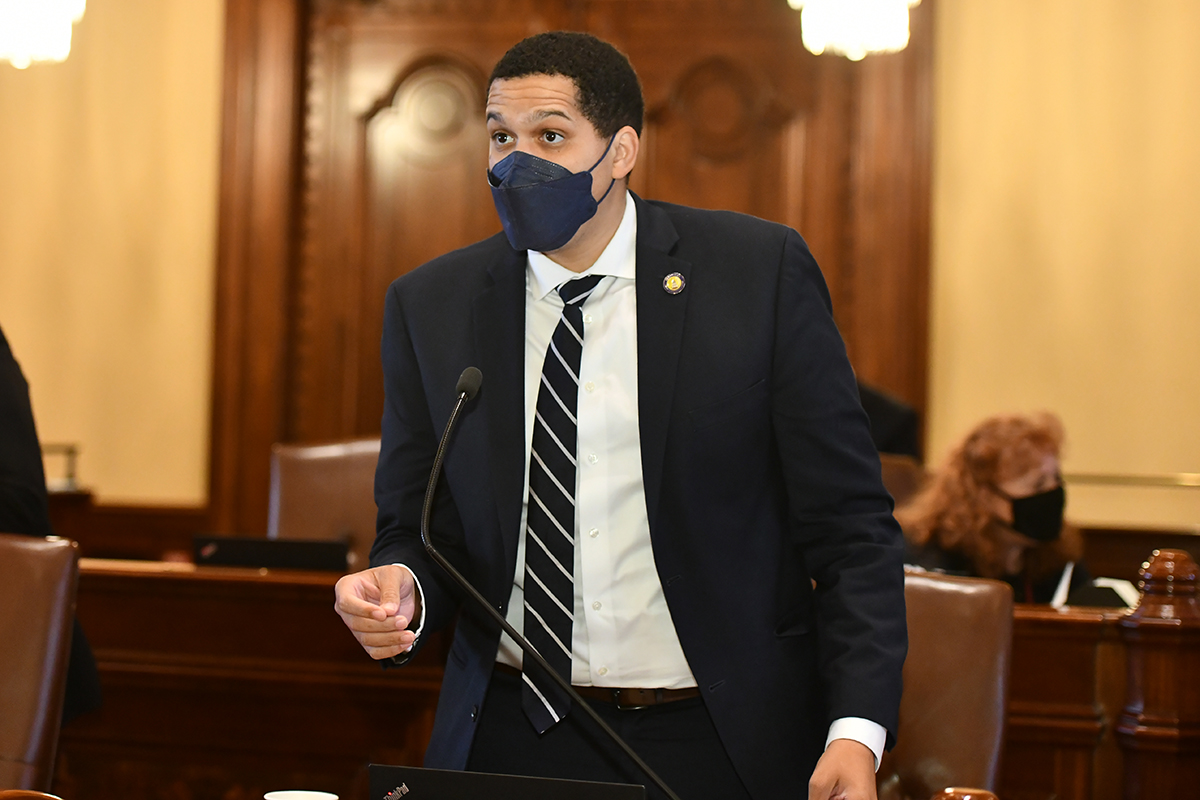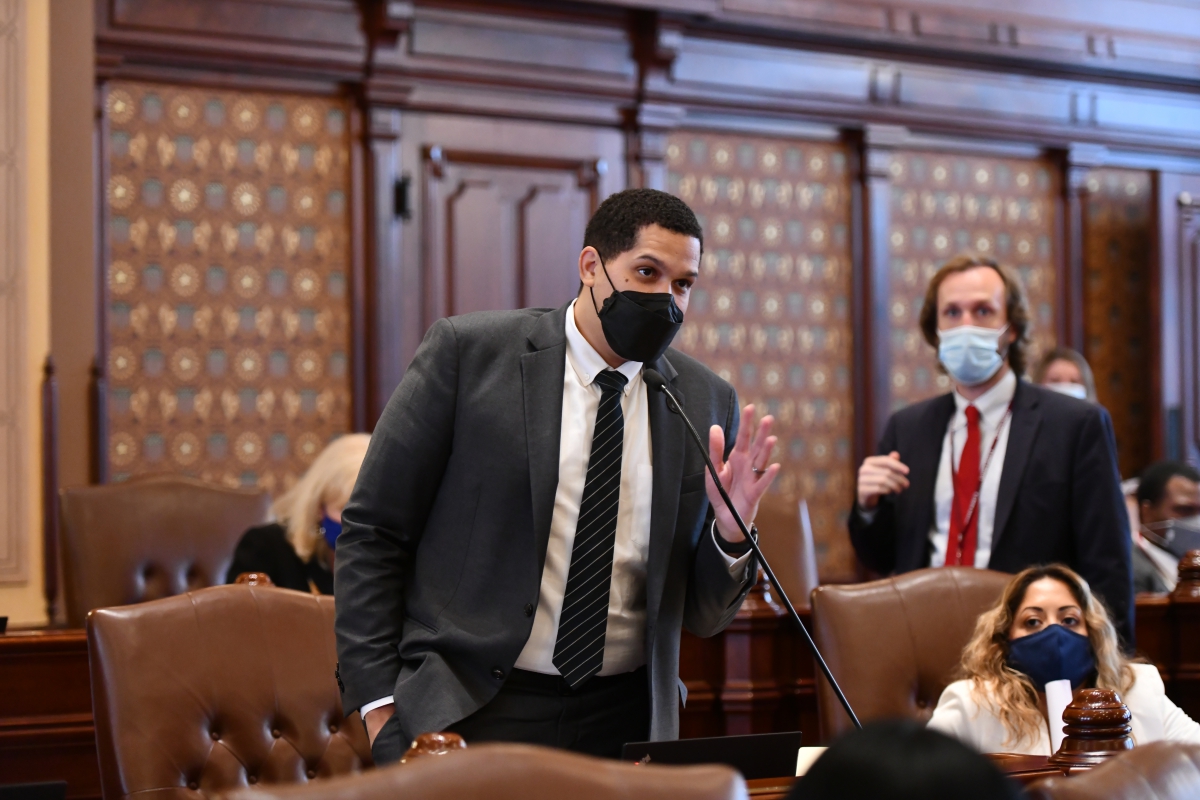- Details
- Category: Senator Robert Peters News

SPRINGFIELD – Illinois could soon be the ninth state to guarantee students daily playtime after a measure sponsored by State Senator Robert Peters (D-Chicago) cleared the General Assembly Sunday.
“When I was growing up, unstructured playtime was a key part of my development, which is why I believe it should be a guaranteed right for all kids,” Peters said. “Physical activity also helps keep children’s minds sharp, and the exercise they get helps keep them healthy.”
Senate Bill 654 requires elementary schools to guarantee at least 30 minutes daily to students in kindergarten through fifth grade each day for supervised, unstructured play. Electronic devices may not be used during this time, and a physical education course does not count to fulfill the legislation’s requirements.
Read more: Senate approves Peters’ measure guaranteeing play time in school
- Details
- Category: Senator Robert Peters News

SPRINGFIELD – The Illinois Senate approved a measure sponsored by State Senator Robert Peters (D-Chicago) aimed at limiting the ability of law enforcement agencies to use intimidation tactics.
“Public safety belongs to the people, and as such, anyone who wants to should be able to participate at public hearings without fear of repercussions,” Peters said.
Under House Bill 1765, law enforcement agencies would be prohibited from conducting a background check on a person if the only reason for doing so is that they’re participating in an open, public meeting. The proposal allows some exceptions, such as when public safety is potentially at risk or in cases where the individual in question is under consideration for an appointment to a government body.
Read more: Peters’ measure limiting law enforcement intimidation clears Senate
- Details
- Category: Senator Robert Peters News

“When you call an emergency number for a medical issue, you get a medical response, but you aren’t able to get a mental health response when you’re having a mental health emergency,” Peters said. “That must change.”
- Details
- Category: Senator Robert Peters News
SPRINGFIELD – Continuing his dedication to improving safety and justice in Illinois communities, State Senator Robert Peters (D-Chicago) moved a measure through the Senate that would expand certain rights guaranteed to victims of violent crimes.
“Survivors of violence and their families have a right to deal with their trauma on their own time without having to risk their livelihoods,” Peters said. “If we don’t guarantee this right, then we’re allowing trauma to beget more trauma.”
The Victims Economic Security and Safety Act entitles victims and family members of victims of domestic, sexual or gender violence in Illinois to various amounts of unpaid leave from work to deal with their trauma. House Bill 3582 extends the act to include any other type of violent crime and provides protections against discriminatory acts by employers. The legislation also allows the paid leave to be taken non-consecutively or as a reduced work schedule.
Read more: Peters’ expansion of victim rights approved by Senate
- Details
- Category: Senator Robert Peters News
SPRINGFIELD – The Illinois State Senate approved a measure sponsored by State Senator Robert Peters (D-Chicago) that would increase transparency around misconduct and discipline at Chicago Public schools.
“Parents lose the ability to properly take care of their children if they don’t know about important events like fights at school,” Peters said. “Parents have the right to know what’s going on at their kids’ schools so that they can help their kids get the proper treatment and care to deal with traumatic events.”
Read more: Peters: Parents have the right to know what’s going on at their kids’ schools
- Details
- Category: Senator Robert Peters News
SPRINGFIELD – Illinoisans living with human immunodeficiency virus will soon be free from fear of criminal prosecution after a measure sponsored by State Senator Robert Peters (D-Chicago) cleared its final legislative hurdle Tuesday.
“Laws that criminalize HIV are outdated, dangerous, discriminatory, and out of line with current science,” Peters said. “This practice has no place in modern society. HIV is a medical condition and must be treated as such. Individuals living with it should not have to fear being punished simply because they are sick.”
Read more: Senate approves Peters’ HIV decriminalization proposal
- Details
- Category: Senator Robert Peters News
 SPRINGFIELD – State Senator Robert Peters (D-Chicago) joined several Senate colleagues Friday voting in support of a proposed constitutional amendment that would guarantee the right to unionize to Illinois workers.
SPRINGFIELD – State Senator Robert Peters (D-Chicago) joined several Senate colleagues Friday voting in support of a proposed constitutional amendment that would guarantee the right to unionize to Illinois workers.
“Labor rights are intertwined with race, class, and gender struggles, and we must always fight to preserve them,” Peters said. “Declaring a worker's right to collective bargain as a fundamental right guaranteed to everyone who works in Illinois is a major step toward winning the real safety and justice in our communities that we’ve been fighting to secure for generations.”
Peters is a chief co-sponsor of Senate Joint Resolution Constitutional Amendment 11, which would prevent the General Assembly or any local units of government from passing laws restricting a worker’s right to collectively bargain for better wages, hours or working conditions.
“The past year has seen some major wins in the fight against systemic oppression, but that fight is far from over, and we need to keep pushing for change that works best for everyone, no matter their ZIP code,” Peters said. “I’m proud to have co-sponsored and supported this measure, and I look forward to continuing similar work as we move forward.”
The resolution passed the Senate with bipartisan support and will next be sent to the House of Representations for consideration. Should it pass that chamber, it would then need to be approved by Illinois voters during the next general election, currently scheduled for Nov. 2022.
- Details
- Category: Senator Robert Peters News

SPRINGFIELD – The Illinois Department of Transportation unveiled its multi-year plan earlier this week, and State Senator Robert Peters (D-Chicago) is pleased to announce that it includes more than $75 million for local projects.
“Heavily trafficked roads and bridges are an extremely important area for our city that too often gets overlooked, so it’s good to know that IDOT is making much needed improvements,” Peters said. “Some of the roads and bridges in the plan this year are in bad shape and have needed repairs for years.”
Read more: Peters announces over $75 million in funding for local roads and bridges
More Articles …
Page 15 of 23















 © 2026 Illinois Senate Democratic Caucus
© 2026 Illinois Senate Democratic Caucus